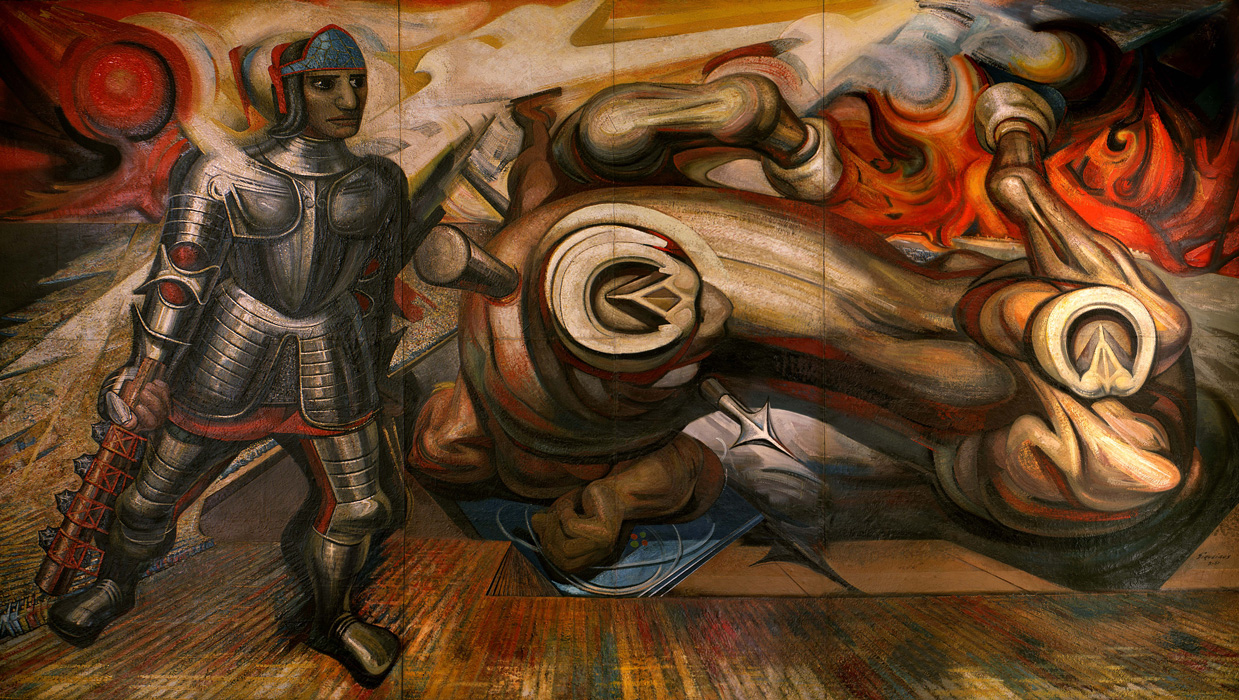One of the most dynamic chapters in the modern arts occurred in Mexico from 1910–1960. The 1910–1920 political revolution ushered in an artistic revolution reflecting its values and resulting in the Golden Age of Mexican Cinema. A vibrant literary scene was dominated by Nellie Campobello, Juan Rulfo, Octavio Paz, and Carlos Fuentes. Visual arts ranged from the intensely political to the abstract and the surreal. Paintings were monumental in scale. While these new art forms served political goals, they also provided artists with a way to re-conceive modernism as a populist art form. Artists Diego Rivera, José Clemente Orozco, and David Alfaro Siqueiros expressed themselves on a grand scale, but there were also expressions of intimacy in the portraits of Frida Kahlo and in the pure abstractions of Rufino Tamayo.
FRIDAY, NOVEMBER 1, 2019 | 7:30 – 9:30 pm
The Politics of Culture in Post-Revolutionary Mexico, 1910-1940 / María Eugenia Vázquez Semadeni (Visiting Professor of History, UCLA)
Professor Vazquez will discuss the political and social environment existing during and after the Mexican Revolution of 1910. She will analyze how and why the post-revolutionary government viewed the development of a national identity as critical to achieving the unification and pacification of the country. The government promoted artistic production in order to create a nationalistic, visual and literary discourse to legitimize their rule as well as their political and social goals. In brief, she will demonstrate how post-revolutionary Mexico supported arts and literature to create a national identity among all Mexicans.
Performance
Los Cenzontles “both honors and upends traditional Mexican music, tapping deep roots as it flowers into something completely new, and distinctly American.” – The New York Times
Before the Revolution, Mexican music was divided between a rural “ranchera” mariachi tradition that began before the arrival of the Spanish and a high-art European tradition that gained currency in the late 19th Century. After the Revolution, Mexican governments encouraged a unified national identity by promoting new, urban, large-scale mariachi music, first on radio and later in films. Los Cenzontles (Nahuatl for “The Mockingbirds”), fronted by the dynamic vocal dueto of Fabiola Trujillo and Lucina Rodriguez, will present traditional, rural mariachi music to accompany dancers, including tunes from their CDs El Chivo and El Toro Viejo, as well as “El Sepulcro de Zapata.”
SATURDAY, NOVEMBER 2, 2019 | 10 am – noon & 1:30 – 4 pm
A New Nation: Mexican Modern Art in Context / Mark Castro (Independent Art Historian / Curator)
In the wake of Mexico’s violent revolution from 1910-1920, artists played a vital role in the construction of a new national identity. The works of the famous mural painters José Clemente Orozco, Diego Rivera, and David Alfaro Siqueiros epitomized this transformation, depicting scenes from Mexico’s past while also imagining its future. These monumental works, though of critical importance, cannot be understood apart from the broader history of Mexican modern art. This lecture offers a glimpse of the complex history of innovation and debate within Mexican art that helped shape the nation and in turn influenced modern art across the globe.
The Novel of the Mexican Revolution. Or the Anti-Novel? / Maarten van Delden (Professor of Latin American Literature, UCLA)
A critic once wondered whether it would be more accurate to speak of the “anti-novel” rather than the “novel” of the Mexican Revolution. Unlike the muralist movement, which offered a celebratory view of the Revolution, the literary works treating the turmoil of the period from 1910 to 1940 were often skeptical and unfavorable in their depictions of the revolutionaries. In this talk, Professor van Delden will trace some of the assessments of the Revolution—ranging from fascination to a kind of horror—developed by authors including Mariano Azuela, Martín Luis Guzmán, Nellie Campobello, Rosario Castellanos, Carlos Fuentes and Elena Garro.
Diego Rivera and Frida Kahlo: Harnessing Tradition in the Service of Avant-Garde Art / Adriana Zavala (Professor of Art History and Latino Studies, Tufts University)
Professor Zavala will discuss the lives and careers of Diego Rivera and Frida Kahlo. Rivera and Kahlo were among revolutionary Mexico City’s most dynamic artists. As a couple, their lives were intimately intertwined in the cultural politics of their day, and as artists they cultivated an intensely creative conversation with one another. Rivera once declared Kahlo’s art the “best proof” of a rebirth of Mexican art, and she, in turn, called Rivera a “marvelous painter and honest revolutionary.” Together they championed Mexican traditions but always with an eye toward creating a resolutely modern Mexican art.
Themes from the Golden Age of Mexican Cinema / Audrey Harris (Spanish and Portuguese, UCLA)
This lecture will begin by tracing Mexican film back to 1896. The Mexican public imagination was set on fire by early newsreels depicting President Porfirio Díaz’s state visits throughout the country, beginning Mexico’s lasting love affair with film. Along with Porfirio Díaz, another star of early Mexican cinema was Pancho Villa, who signed an exclusive contract with the Mutual Film Company in 1914 to film his battles in the Revolution. Díaz and Villa’s starring turns prefigured two important themes of Mexican cinema of the Golden Age (1933-1964): the comedia ranchera, which idealized life in the Mexican countryside (during an era of mass rural-to-urban migration), and the filming of the Revolution. The burgeoning cine negro (film noir) genre took a dark look at mid-century life in the big city; and rumbera films contrasted their gritty subject matter with sultry song and dance numbers. The presentation will include clips of classic films by representative directors and cinematographers, including Emilio ‘el Indio’ Fernández, Roberto Gavaldón, Gabriel Figueroa, and Spanish émigré Luis Buñuel.
Discussion with the Presenters / George Hammond, Moderator (Humanities West)
